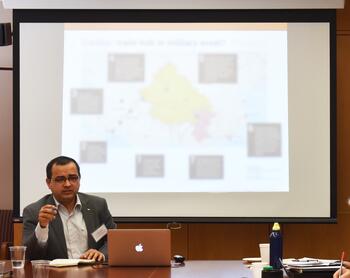For Kate Imy, APARC’s 2021-22 Lee Kong Chian NUS-Stanford Fellow on Contemporary Southeast Asia, writing feminist military history means not only “finding” or “adding” women to the stories of war, even though that is, in itself, a necessary intervention. It also means recognizing how gender shapes almost everything we know, understand, praise, or condemn about wars and militaries more broadly. Writing military history with a feminist-lens shapes Imy's understanding of how militaries are formed, who serves in them, and why they matter.
Dr. Imy joins the Walter H. Shorenstein Asia-Pacific Research Center (APARC) as Visiting Scholar and 2021-22 Lee Kong Chian NUS-Stanford Fellow on Contemporary Southeast Asia. Hosted jointly by APARC’s Southeast Asia Program and the Faculty of Arts and Social Sciences at the National University of Singapore, the fellowship advances the visibility and quality of scholarship on contemporary Southeast Asia. Imy, who is currently an Assistant Professor of History at the University of North Texas, is using her residency at APARC during fall 2021 to research the colonial roots of winning "hearts and minds" in war, specifically focusing on Singapore and Malaya.
On December 2 at 5 p.m. PT, Dr. Imy will present a public talk, Pregnant in the Jungle: Gendering Resistance in the Malayan Emergency, where she will discuss the reconfiguration of gender expectations in the Malayan Emergency (1948-1960), a period of unrest following the creation of the Federation of Malaya that is perhaps most famous for Sir Gerald Walter Robert Templer’s phrase about the need to win the “hearts and minds” of civilians to defeat a communist insurgency. Register now to join the webcast.
We caught up with Dr. Imy to discuss her work and experience at Stanford this quarter.
What has shaped your interest and research into questions of identity in British Imperial history?
I grew up in California and currently live in Texas — two influential, diverse border states where military service is prevalent. I also briefly attended the United States Air Force Academy, where I learned a lot about how race, gender, and faith shape the experience of military service. These animated my interest in the history of empires, war, race, and gender. While working on a PhD at Rutgers, I came across not one but two British officers who had an equal love for yoga and fascism — two things that I had previously considered to be rooted in opposing cultural impulses. Learning about how and why these linkages made sense have encouraged me to continue thinking critically about how war and empire shape culture.
In your current book project on the colonial origins of the "winning hearts and minds" idea of war, what is something surprising you’ve come to realize about that term?
My research in some ways is less interested in the novelty of the term than how reactionary it was to existing colonial policies. British leaders articulated the desire to “win hearts and minds” because previous generations of military and colonial leaders had failed to do so. The traumatic experiences of colonialism and war inspired civilian resistance to military occupation. In many ways, the idea of winning hearts and minds through militaries is an oxymoron because for civilians, “winning” would be an end to military occupation and violence. Most exciting to me is that many soldiers serving in the region during the colonial era — who were diverse subjects with roots in India, Nepal, East Africa, China, Australia, and New Zealand — tended to agree.
How has your time at APARC as the Lee Kong Chian Stanford-NUS Fellow aided your research project?
I have benefitted tremendously from my time at Stanford. I researched materials at the Hoover Institution related to communism in Singapore and Malaya, providing me with additional opportunities to reflect on a plurality of voices shaped by communism and anti-communism. I have had generative meetings with students and scholars that push me to think about these dynamics in new ways. My focus is currently consolidating my archival research and drafting new chapters, so having access to Stanford’s library has assisted greatly in this process. Finally, I met with a representative of an academic press in the area and am preparing a book proposal for submission by the end of my fellowship period.
Which connections made during your time at APARC have been particularly beneficial to you?
COVID has prevented some meetings but facilitated others, including through virtual events. I attended the talk by Sugata Bose on “Young Asia,” moderated by Stanford History faculty Partha Pratim Shil. I also attended the event on “Home, Land, Security” by Carla Power and moderated by Stanford anthropologist Sharika Thiranagama. I met with Stanford undergraduate student Chern Xun Gan to discuss my archival research, as he has an interest in the Malayan Emergency. At APARC, I’ve enjoyed meeting South Asia Research Scholar Arzan Tarapore, whose work on the military in South Asia overlaps with my own interest. I had a fantastic conversation with Stanford History Department Professor Priya Satia, whose expertise in British colonial histories of war has had a great impact on my research and writing. I have also benefitted from several conversations with Southeast Asia Program Director Donald Emmerson. Overall, Stanford and APARC have been welcoming and insightful places to work.
You traveled to Singapore for part of your fellowship. What did you accomplish there? Were there any special collections at NUS that you accessed?
I completed the first part of my fellowship in Singapore from March to June 2021. I spent some time in the NUS archives and meeting (remotely) with various scholars at NUS, including Maitrii Aung-Thwin and Seng Guo Quan. I also met several NTU faculty, including Jessica Hinchy, Tapsi Mathur, and Faizah Zakaria. However, the bulk of my time was spent in the National Archives. There I found immense resources related to each section of my book, including the Singapore Mutiny (1915), the Japanese occupation (1942-1945), and the Malayan Emergency (1948-1960). COVID limitations to library hours meant that I had to photograph a massive quantity of materials, which I am currently working through now. These have been especially valuable for strengthening Indian and Chinese perspectives of war in Singapore and Malaya, and I look forward to foregrounding these perspectives in my book.
What is on the horizon for you? What's next?
After leaving Stanford, I will look forward to revising my book manuscript and submitting it to a university press. This will occupy much of my focus throughout 2022, with a view to publishing the manuscript in 2023. Beyond that, I will look forward to continuing my research on war and empire in the Asia-Pacific — possibly even incorporating further research on my home state of California!




![[Left] Gerald Sim, [Right] the cover of 'Postcolonial Hangups in Southeast Asian Cinema'](https://fsi9-prod.s3.us-west-1.amazonaws.com/s3fs-public/styles/727x409/public/hero/sim_book_hero_1.png?h=c4d9845d&itok=Nweh65PP)




![[Left] Gerald Sim, [Right] the cover of 'Postcolonial Hangups in Southeast Asian Cinema'](https://fsi9-prod.s3.us-west-1.amazonaws.com/s3fs-public/styles/895x498/public/hero/sim_book_hero_1.png?h=c4d9845d&itok=oxcmqKi8)


